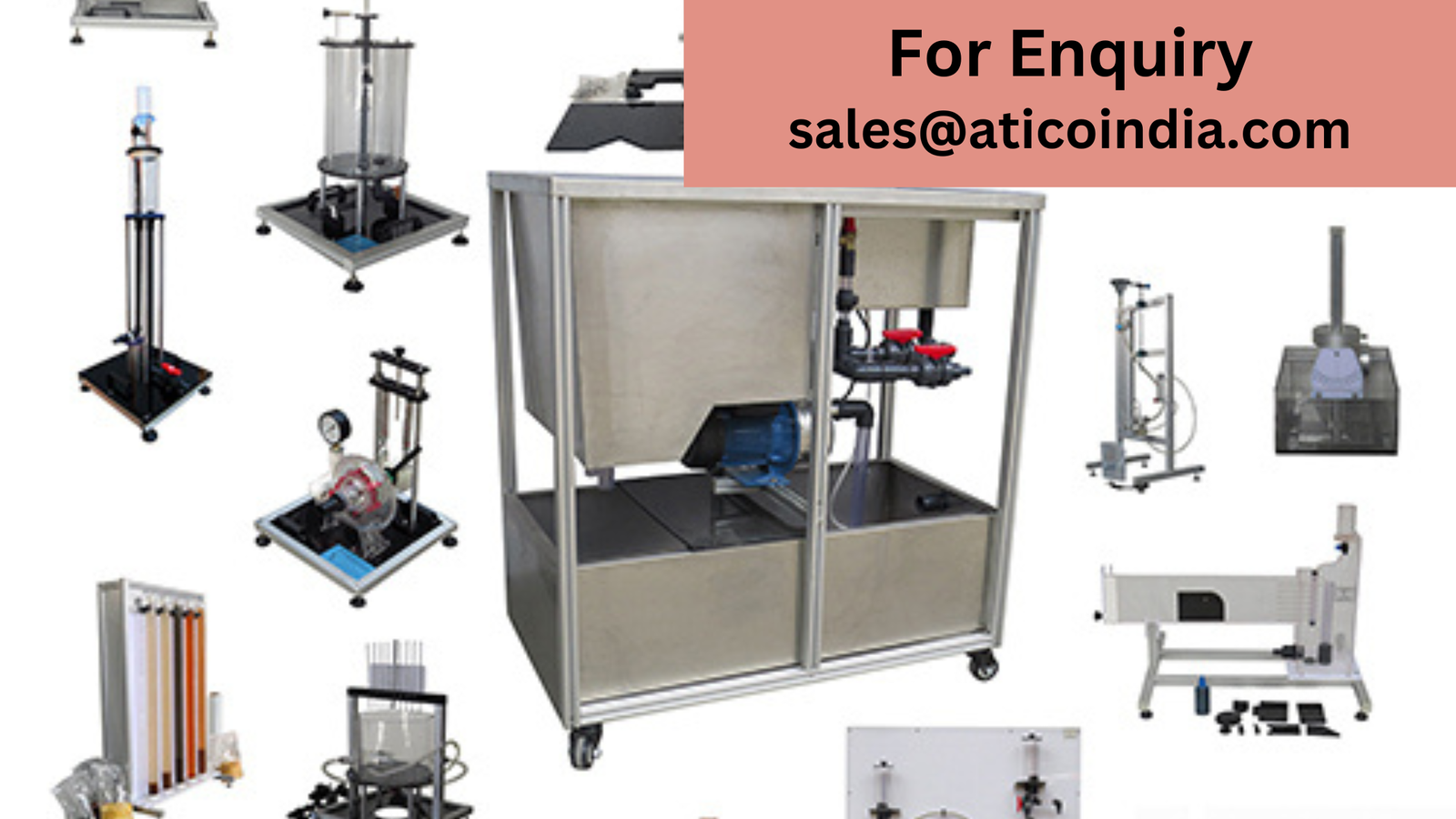Flow Dynamics
Fluid Kinematics
Fluid Dynamics
Hydrodynamics
Aerodynamics and Hydrodynamics
Turbulence
Fluid-Structure Interactions
Multiphase Flows
Heat Transfer
Experimental Techniques
Computational Fluid Dynamics (CFD)
Environmental Fluid Mechanics
The specific research focus of a fluid mechanics lab can vary depending on the goals of the research institution, the expertise of the researchers, and the available Fluid Mechanics Lab Equipment.
10 Must-Have Fluid Mechanics Lab Equipment for Cutting-Edge Research
High-Speed Wind Tunnel
Purpose: Investigating & understanding aerodynamic phenomena at extreme velocities
Description: A high-speed wind tunnel simulates and analyzes airflow patterns, turbulence, and pressure distribution under conditions comparable to those experienced by aerospace and high-speed vehicles. Researchers use this equipment to enhance the understanding of aerodynamic forces, optimizing vehicle performance, fuel efficiency, and safety.
Application: to study airflow patterns, turbulence, and pressure distribution for aerospace and automotive designs. It has found its application in indoor skydiving facilities.
Laser Doppler Velocimeter (LDV)
Purpose: Accurate Measurement of Fluid Velocity Profiles
Description: The Laser Doppler Velocimeter (LDV) offers precise non-intrusive fluid velocity measurements at specific flow field points. It works on the Doppler principle. It uses laser light to detect velocity fluctuations caused by moving particles.
Applications: it is widely used in engineering, biology, and medicine, where precise velocity data is critical for fluid flow analysis.
Particle Image Velocimetry (PIV) System
Purpose: Visualizing, Quantifying, and Studying Fluid Flow Patterns
Description: The Particle Image Velocimetry (PIV) system from the top Fluid Mechanics Lab Equipment Manufacturer is designed to capture high-resolution images of tracer particles within a fluid.
The researchers analyze flow patterns, turbulence, and velocity gradients with these images. This equipment provides insight into complex fluid dynamics. Eventually, it aids the design and optimization of various systems, from aircraft wings to combustion engines.
Application: marine propulsion, aerodynamics, combustion, environmental modeling, oceanography, and biofluids
Capillary Electrophoresis System
Purpose: Investigating Microfluidic Behavior and Molecular Interactions
Description: Capillary Electrophoresis involves separating charged molecules based on electrophoretic mobility in a capillary filled with an electrolyte solution. This technique is essential for studying microfluidic behavior, molecular interactions, and analyzing biomolecules.
Applications: Fluid lab equipment suppliers cater to the following industries that extensively use Capillary Electrophoresis Systems include:
Pharmaceuticals and Biotechnology
Genomics and Proteomics
Environmental Monitoring
Food and Beverage Industry
Forensics and Clinical Diagnostics
Biomedical and Clinical Research
Microfluidics and Lab-on-a-Chip Technology, and many more
Hydraulic Bench
Purpose: Studying Fluid Flow Fundamentals and Hydraulic Systems.
Description: A hydraulic bench demonstrates fundamental fluid mechanics principles, such as Bernoulli's theorem, pipe friction, and flow measurement techniques.
Applications: A wide range of industries use hydraulic benches to provide continuous and controlled water supply to conduct various experiments in the following fields:
Environmental Engineering
Fluid Systems Design and Testing
Education and Research Institutions
Water Management and Distribution
Plumbing and Piping Systems Design
Hydraulic Machinery Design
Viscometer/Rheometer
Purpose: Measure the Viscosity and Flow Behavior of Fluids
Description: Viscometers and rheometers assess fluids' viscosity and flow properties under various conditions. Different viscometer types help understand the behavior of materials like fluids, gels, and pastes.
Applications: If you are working or related to any of the following fields, then it is time you connect with fluid lab equipment suppliers to experiment with top-quality viscometers.
The fluid lab equipment suppliers have many industries to cater to. Some of the most popular are:
Pharmaceuticals
Paints, Inks, and Coatings
Oil and Petrochemicals
Chemical Industry
Adhesives and Sealants
Polymer and Plastics Industry
Rotating Arm Viscometer
Purpose: Analyzing Non-Newtonian Fluid Behavior under Shear
Description: Fluid lab equipment manufacturers manufacture it, especially for industries dealing with materials like paints, adhesives, and food products. It is a vital tool for researchers that help them predict and control the flow behavior of complex fluids.
Applications: Rotating arm viscometers find applications in industries that deal with fluids with different shear rates. Some of its application industries are:
Paints, Coatings, and Inks
Food and Beverage
Cosmetics and Personal Care
Pharmaceuticals
Multiphase Flow Visualization Rig
Purpose: Observing Complex Interactions between Fluids and Solids.
Description: The multiphase flow visualization rig enables researchers to study the behavior of fluid-solid mixtures, such as sediment transport in rivers or slurries in industrial pipelines.
Applications: A Multiphase Flow Visualization Rig helps understand complex interactions and phenomena in multiphase flows. Some of its applications are:
Oil and Gas Industry
Chemical Engineering
Environmental Engineering
Pharmaceuticals
Food and Beverage Industry
High-Performance Liquid Chromatography (HPLC)
Purpose: HPLC is an analytical technique that separates, identifies, and quantifies individual components in a liquid mixture.
Description: A liquid sample passes through a high-pressure column packed with a stationary phase in HPLC. They are then separated based on chemical properties such as polarity, size, and affinity.
Application: its ability to separate, identify, and quantify different components in a liquid mixture broadens its application to the following industries:
Pharmaceutical Analysis
Clinical Diagnostics
Environmental Monitoring
Food and Beverage Industry
Forensic Analysis
Biochemical Research
Hydrometer
Purpose: A hydrometer is an instrument used to measure a liquid's density or specific gravity.
Description: It determines the relative weight of a liquid, providing insights into its composition and properties.
Application: Hydrometers have various applications across different industries:
Beverage Production
Chemical Industry
Battery Testing
Agriculture and Horticulture
Environmental Monitoring
Dairy Industry
Metal Plating and Electroplating
For the technical description of these and any other fluid lab equipment vital for your lab, please connect with Atico India's supply division, fluids lab equipment suppliers. A click or a call away, their team provides the best product information, product quality, and product services at a price unmatched by any other reputed supplier.



0 Replies to “Methods of the recruitment”